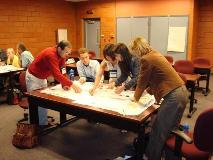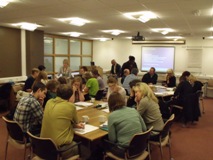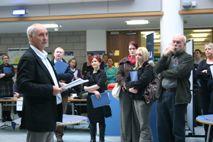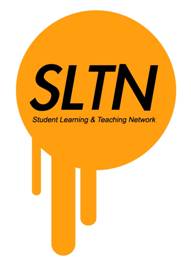- Conference
Background - Conference
Themes - Conference
Sessions - Presenters
- Conference
Programme - Conference
Proceedings
This conference is dedicated to improving the student learning experience. It will provide a forum for sharing and discussing practices and theories around the development of the autonomous learner, the role of Enquiry Based Learning in HE and the changing conceptions of the nature of graduateness.
Delegates will have the opportunity to engage with practices, research and ideas that will help them to develop their own approaches to learning and teaching. It will also, although not exclusively, provide a forum for sharing the learning that has arisen from the work of the Learning Through Enquiry Alliance. International presentations and delegates will enrich the event by bringing global practices and experiences to the conference.



Achieving an outstanding student learning experience through Enquiry Based Learning
Learner Autonomy and the student learning experience
Designing learning spaces to support learner autonomy
The role of assessment in achieving learner autonomy
Achieving learner autonomy as a graduate attribute
Transitions and the student learning journey
The use of technology in achieving an outstanding student learning experience
Learning in partnerships
Student voices
Developing communities of practise
Professional, Educational and Curriculum Development
1. Workshops
These 90-minute sessions are designed to be highly interactive. Participants should be given the opportunity to explore the theme of the workshop, and to share practice as well as to benefit from the experience of the presenter. Submissions should identify clearly the intended outcomes and processes involve
2. Practise based papers and presentations
These 30-minute sessions should be more than simple descriptions of practice. Case studies are welcomed, but should provide evidence of the effectiveness or outcomes of the practise. Participants should be engaged and involved throughout the session and not only at the end.
3. Philosophical papers
Presenters will have 30 minutes to discuss a theory, philosophy or approach to teaching or supporting development and learning consistent with a conference theme, which is based on evidence, evaluation, observation or initial research findings.
4. Research papers
Presenters will have 30 minutes to present their research findings. There should be active involvement of the participants and time should be given for a discussion of the research outcomes. A good paper will include a discussion of how the research findings may lead to changes in practice.
5. Posters
These can include research, case studies, philosophies or any interesting message consistent with the conference themes. Proposals should identify the structure, content, methodology if relevant, conclusions and discussion. The conference team will consult with successful poster presenters on the specific design parameters of their posters.
6. Audio visual presentations
Submissions using audio visual presentation methods are welcomed. Proposals should identify the structure, content, methodology if relevant, conclusions and discussion. The conference team will consult with successful presenters on the specific nature, design parameters and requirements of their presentation.
| Terri Grant | Keynote Speaker
Terri Grant heads the Professional Communication Unit in the School of Management Students at the University of Cape Town. As one of the founder members, her principal aim is to prepare students for the communicative demands of their professions. To this end, she consults widely in business and industry to ensure that academic and work-based practices are well aligned. As lead author, her book, Communicating @ Work: boosting your spoken, written and visual impact, (2nd ed.) is prescribed at three institutions and recommended reading at several others. As team leader, she was recently honored with an Innovative Teaching Practice award for her work on Scenario Learning and Pedagogy. |
|
 |
The Student Learning and Teaching Network
The network enables students to meet together, share and develop through our various workshops, conferences and online communities. We encourage all students involved in learning and teaching to share their ideas, and experiences.
Find out more and join the online network community at http://studentlandtnetwork.ning.com/ |
Day 1, 15th June | Day 2, 16th June
Conference Themes
1. Achieving an outstanding student learning experience through Enquiry Based Learning
2. Learner Autonomy and the student learning experience
3. Designing learning spaces to support learner autonomy
4. The role of assessment in achieving learner autonomy
5. Achieving learner autonomy as a graduate attribute
6. Transitions and the student learning journey
7. The use of technology in achieving an outstanding student learning experience
8. Learning in partnerships
9. Student voices
10. Developing communities of practice
11. Professional, Educational and Curriculum Development
Day 1 am | pm
9.00 to 10.00 |
Registration Tea/coffee available - Heartspace, Level 2, Owen |
|||||||
10.00 to 11.00 |
Opening plenary |
|||||||
Workshops |
Paper Presentations |
|||||||
Time |
Owen 221 |
Owen 222 |
Owen 223 |
Owen 1026 |
Time |
EMB 3106 |
EMB 3114 |
EMB 3115 |
11:00 to 12:30 |
Danielle Hinton & Tarsem Singh Sooner (Birmingham) |
Katja Stuerzen-hofecker, Richard Benda & Anna Snape (Manchester) |
Mike Bramhall, Allan Norcliffe, Justin Lewis & Keith Radley |
Kerry Lovell, Keith Norman |
11:00 to 11:30 |
Claire Craig |
Jackie Cawkwell & Viv Thom |
Sarah Naylor |
11:30 to 12:00 |
Anne Nortcliffe & Andrew Middleton |
Christine O'Leary |
Felicity Mendoza |
|||||
12:00 to 12:30 |
Emma Robertson |
Ivan Moore |
Mark O'Hara & Abbi Flint |
|||||
12.30 to 13.30 |
Lunch |
|||||||
13.30 to 14.30 |
Keynote |
|||||||
Workshops |
Paper Presentations |
|||||||
|
Owen 221 |
Owen 222 |
Owen 223 |
Owen 1026 |
VR Suite |
Time |
EMB 3114 |
EMB 3115 |
14:30 to 16:00 |
Adele Aubery (Manchester) |
Julie Evans |
Godfrey Craik |
Kiefer Lee & Claire Craig |
Richard Mather, Geoff Birkett & Penny Collier |
14:30 to 15:00 |
Sue Walsh & Karen Booth |
Simon Polovina, Siavash Moshiri & Richard Hill |
15:00 to 15:30 |
Danny Weston |
Ben Abell |
||||||
15:30 to 16:00 |
Rahat Iqbal |
Norman Powell (Manchester) |
||||||
16.00 to 17.30 |
Group activities |
|||||||
19.00 to 19.30 |
Reception |
|||||||
19.30 |
Conference dinner |
|||||||
Day 2 am | pm
9.00 to 10.00 |
Student Plenary |
|||||||
10.00 to 10.30 |
Coffee |
|||||||
|
Workshops |
Papers |
||||||
Time |
Owen 221 |
Owen 222 |
Owen 223 |
Owen 1026 |
EMB 3106 |
Time |
EMB 3113 |
EMB 3115 |
10:30 to 12:00 |
Mark Jasper, Anna Verges & Adele Aubery (Manchester) |
Nadine Wills & Ciaran Hurley (Sheffield) |
Phil Askham |
Chris Glover, Amanda King & Ben Partridge |
Terri Grant & Claudia Kalil (Cape Town) |
10:30 to 11:00 |
Chris Short |
Sarah Naylor |
11:00 to 11:30 |
Oksana Fedotova |
Lynn Cinderey |
||||||
11:30 to 12:00 |
Hilary Cunliffe-Charlesworth & Keith Radley |
Anne Nortcliffe, Elaine Stringer, Peter Cogill, Bridget Winwood & Andrea Kelcher |
||||||
12.00 to 12.30 |
Group activity |
|||||||
12.30 to 13.30 |
Lunch |
|||||||
Workshops |
Paper Presentations |
||||||
Time |
Owen 221 |
Owen 222 |
Owen 223 |
Owen 1026 |
Time |
EMB 3113 |
EMB 3115 |
13:30 to 15:00 |
Jamie Wood, Louise Goldring & Kate Jones (Manchester) |
Danielle Hinton & Matt Bridge (Birmingham) |
Paul Taylor & The Reinvention Centre (Warwick) |
Ruth Roberts, Lexie Freedman |
13:30 to 14:00 |
Fufy Demissie Themes: 6 |
Melanie Giles (Manchester) |
14:00 to 14:30 |
Ivan Launders, Richard Hill, Simon Polovina & Babak Khazaei |
Stephen Lofthouse |
|||||
14:30 to 15:00 |
Rachel Bower, Cristina Lopez-Moreno & Maria Scheule |
Eva Nordmark & Christina Gummesson |
|||||
15.00 to 16.00 |
Closing plenary and depart |
||||||
Conference Proceedings - Download (PDF)
Further information
Please return to this site for updated information about the conference or email CPLA if you have any questions.
